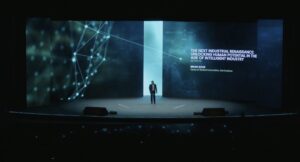
Shot at Web 2.0 Summit 2008
Facebook is learning to listen.
In the middle of February 2009, the company was yet again a “Beacon” for bad PR as it introduced an updated Terms of Service (Tos) for its entire community of users. We the people responded with defiance and vigor and the company retracted its new language, reverted to the previous ToS, and listened to the valuable feedback that poured in from the community.
By all accounts, this was the right thing to do.
Today in a blog post entitled, “Governing the Facebook Service in an Open and Transparent Way,” Facebook’s Mark Zuckerberg released a publicly influenced iteration of its new terms in draft form and invited the public to provide feedback and input.
“Our main goal at Facebook is to help make the world more open and transparent. We believe that if we want to lead the world in this direction, then we must set an example by running our service in this way. We sat down to work on documents that could be the foundation of this and we came to an interesting realization—that the conventional business practices around a Terms of Use document are just too restrictive to achieve these goals. We decided we needed to do things differently and so we’re going to develop new policies that will govern our system from the ground up in an open and transparent way.”
The company is employing one of the social web’s greatest assets, people. In doing so, Facebook is banking on a new genre of user-generated governance (UGG) to improve brand equity as well as customer interaction and loyalty.
Zuckerberg continued, “Beginning today, we are giving you a greater opportunity to voice your opinion over how Facebook is governed. We’re starting this off by publishing two new documents for your review and comment. The first is the Facebook Principles, which defines your rights and will serve as the guiding framework behind any policy we’ll consider—or the reason we won’t consider others. The second document is the Statement of Rights and Responsibilities, which will replace the existing Terms of Use.”
More About the New User Participation Mechanisms:
Transparency and User Input
Facebook will host virtual Town regarding the proposed Principles and Statement of Rights and Responsibilities for 30 days, with the comment period scheduled to close at 12:01 am PDT on March 29. During this time, we have an opportunity to comment on the proposed policy. You can discuss the Principles in this group; and Statement of Rights and Responsibilities in this group.
After the comment period ends, Facebook will review and consider submissions. Facebook will then republish the Principles and Statement of Rights and Responsibilities, incorporating any changes it has made. The company will also provide users a summary of the most common and significant comments received, including its response to those comments.
If these documents are approved, then all future policy changes would be subject to notice and comment periods. Facebook would then publish a final policy proposal that reflects the comments received.
Direct Voting
Following the first Town Halls, The Facebook Principles and the Statement of Rights and Responsibilities will be the first set of policies subject to a vote. The vote will be open to all Facebook users active as of February 25, 2009. The results of the vote will be made public and will be binding if more than 30% of all active registered users vote.
If users approve the draft Statement of Rights and Responsibilities, then all future policy changes would be eligible for a vote by users, provided the level of intensity of user interest would justify it. User interest would be determined by the number of users who comment on any proposed change during the comment period.
User Council
Facebook also announced its intention to establish a user council to participate more closely in the development and discussion of policies and practices. As a start, the company indicated that it would invite the authors of the most insightful and constructive comments on the draft documents to serve as founding members of the group.
Creating a Community for Influence
The PR team also created a group within the popular network to communicate more transparently and efficiently with influential voices – those press, analysts, bloggers and pundits who actively cover and analyze the company’s activities and business strategies.
“Welcome to the official group for reporters, bloggers and industry influencers following Facebook. As a member, you will be among the first to learn about new developments at Facebook.”
I believe this move, although long overdue, is a positive step for improving the foundation for future corporate communications and will serve as the epitome and standard for other brands as well as any organization involved in “public relations” and policy making moving forward.
Transparency, genuine intent and proactive communication (in advance of public introduction) will inspire useful and less speculative conversations in the social web. By engaging and involving those who shape the brand perception, Facebook and companies who follow suit, will improve the foundation for important relationships and ultimately set the stage to proactively steer the interpretation of future activity and positively steer brand awareness and resonance.
The Dawn of User Generated Governance
Facebook is serving as one of the most prominent examples of socialized media in action and is building one of the world’s largest new networks dedicated to changing, and ultimately enhancing, how we communicate and interact with each other, and also how we build, nurture, and even define online relationships.
As content contributors and relationship managers, we’re proactively investing in the social economy and Facebook is among the most vital global exchanges for earning a more equitable individual and corporate brand – determined by the capital we net as a result of our interaction within Facebook and also across the Social Web.
We become influencers.
Crowdsourcing policy change or any activity that involves the public it serves is the future of the social web. We’ll see increased activity and transparency from corporations to small businesses to local and national government agencies – all the way to the White House.
Companies in general often underestimate the ability to catalyze a public response – whether positive or negative. Control is but a mere illusion. It is the recognition of this stature, associated public responsibility, and the corresponding cause and effect as it relates to people specifically that will force the rapid evolution of outward and inward Public Relations policies and practices to improve interaction, instill trust, and engender champions.
This evolution will humanize the entire process of development, communication and support, commencing with the creation or iteration of a product, service, or policy, followed by the public introduction of the news and information, as well as the associated response – measured by company engagement, public sentiment and ultimately relationships.
It is this realization that will inspire a new era of crowd-sourced brands as companies embrace the value and potential of the people who define not only the health, state, and future of its population, but also serve as its community ambassadors to the rest of the world.
Related Posts on PR 2.0:
– Barack Obama and User Generated Governance
– Facebook and the Reality of Your Online Content
– The Socialization of Your Personal Brand
– In the Social Web, We Are All Brand Managers
– Facebook is the Hub for Your Personal Brand
– Facebook is a Beacon for Bad PR
– Mark Zuckerberg Listens and Responds to Beacon Crisis
– Beware the Things You Share in the World of Social Media
– The Essential Guide to Social Media
– The Art and Science of Social Media and Community Relations





I for one am excited about bringing the user directly into the governance process. In Facebook’s instance, I believe this has been happening reactively in increasing measure over the last 12 months. Facebook acts, the user reacts, and the process refines and moves on – probably not in the way Facebook originally thought, certainly subject to loud vocalization, but definitely in a direction that is ultimately good for the user base.
A more involved user base can change the reactive nature of this beast to a proactive partnership – good for all. However, this same principal applied to technological leadership and innovation can have an adverse effect. Any good developer will tell you that it is foolish to ignore the target audience, but every great developer will also espouse the benefit of solitary brilliance. Ultimately, the best solutions from the technological perspective find that balance between good and great, between audience participation and singular inspiration.
Hopefully, Facebook will find the balance in all of these areas. I for one am hopeful.
Steve Repetti
http://www.dataportability.org
http://www.radwebtech.com
http://www.scrapplet.com
Just for a lighter moment …Facebook is now trying to follow the rule By the people and for the people. 🙂
Just for a lighter moment …Facebook is now trying to follow the rule By the people and for the people. 🙂
>every great developer will also espouse the benefit of solitary brilliance.
We users no longer need you to work in your splendid solitude when you are creating social media software that directly impacts us. Code us into the governance mechanism as equal partners in deciding about development decisions from the outset, or get out.
@prokpfy, I agree a hundred percent that the user must be incorporated into the governance model of any community-based organization — web or otherwise. My issue relates to technological innovation, which history has shown tends more often to come from the few, not the many. After all, it wasn’t community that invented Linux, Relativity, or the Wireless.